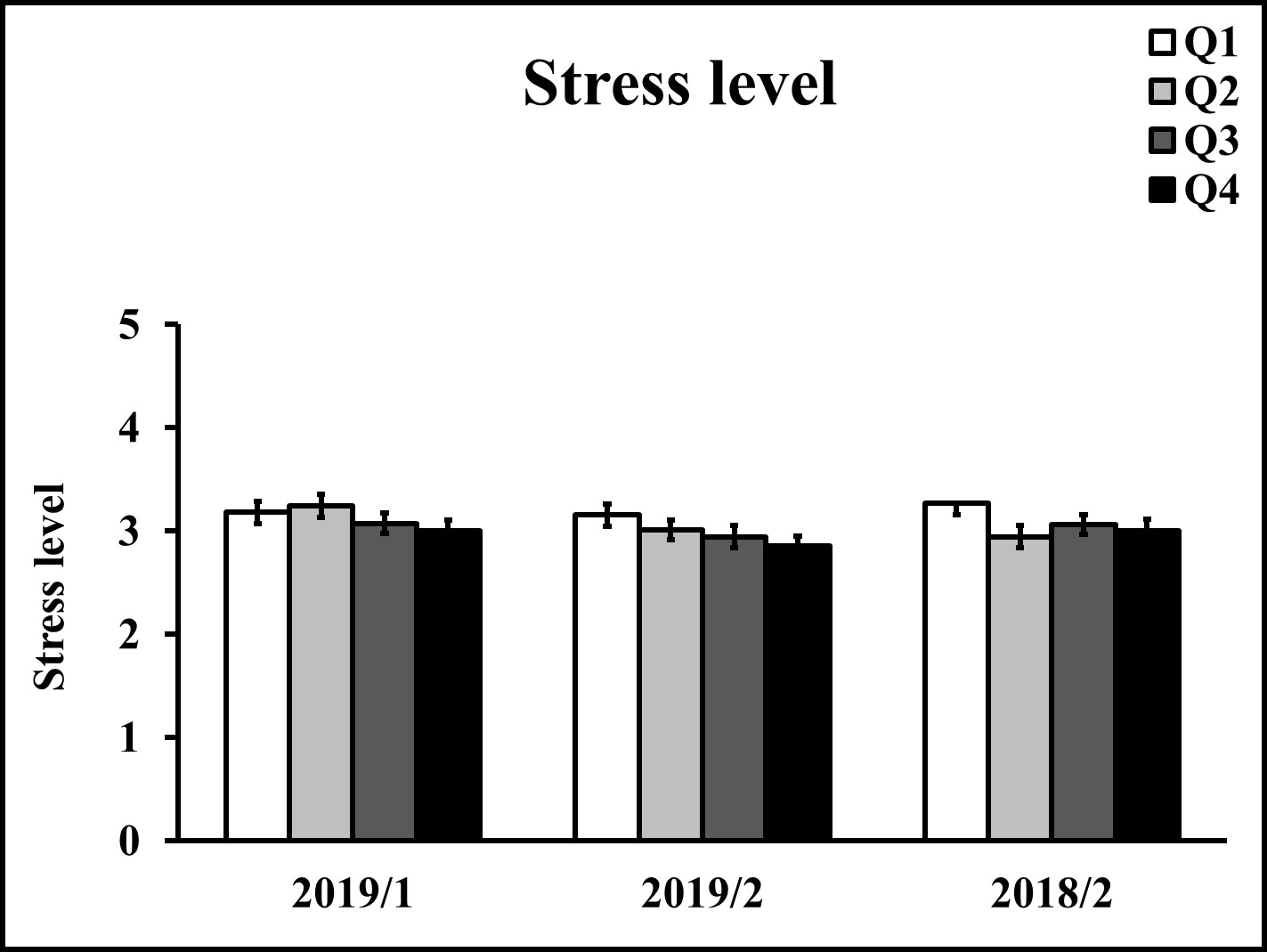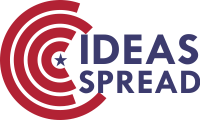Factors Influencing Academic Achievement in Preclinical Students
Abstract
Academic achievement is a major concern of preclinical students. This study aimed to determine factors influencing academic achievement in preclinical years. Questionnaires were sent to all students of the 2019 class at the 1st (2019/1) and 2nd preclinical years (2019/2) and the 2018 class at the 2nd preclinical year (2018/2) without sampling, with 85.11% (280/328), 86.32% (284/328), and 83.54% (274/328) being returned, respectively. Students were divided into Q1 (lowest)-Q2-Q3-Q4 (highest) according to quartiles of their GPA. Q4 students had higher examination expectation and achievement of study targets in all classes and more time spent on non-recorded-e-lecture study in the 2018/2 and 2019/2 classes; but lower time spent on recorded-e-lecture study in the 2019/1 class and non-academic-internet use in the 2019/2 and 2018/2 classes than other groups. In contrast, Q1 students had higher instances of lateness and absence/year in the 2019/2 and 2018/2 classes but lower happiness scores in the 2018/2 class compared to other groups. Obese and overweight students had significantly lower GPA than normal weight and underweight students of the 2019/2 class (p<0.05 all). The current year GPA had significant positive correlations with the previous year GPA, examination expectation, achievement of study targets, and time spent on non-recorded-e-lecture study; but had significant negative correlations with time spent on recorded-e-lecture study and non-academic internet use, instances of lateness and absence/year, and BMI (p<0.05 all). In conclusion, students with more self-regulation strategies in many aspects of self-regulated learning, including time management, learning strategies, emotion control, motivation, and self-efficacy, had better academic outcomes.
References
AlFaris, E., Irfan, F., Ponnamperuma, G., Jamal, A., Van der Vleuten, C., Al Maflehi, N., . . . Ahmed, A. M. A. (2018). The pattern of social media use and its association with academic performance among medical students. Med Teach, 40(sup1), S77-s82. https://doi.org/10.1080/0142159x.2018.1465536
Appropriate body-mass index for Asian populations and its implications for policy and intervention strategies. (2004). Lancet, 363(9403), 157-163. https://doi.org/10.1016/S0140-6736(03)15268-3
Artino, A. R. J., Dong, T., DeZee, K. J., Gilliland, W. R., Waechter, D. M., Cruess, D., & Durning, S. J. (2012). Achievement Goal Structures and Self-Regulated Learning: Relationships and Changes in Medical School. Academic Medicine, 87(10), 1375-1381. https://doi.org/10.1097/ACM.0b013e3182676b55
Azizi, S. M., Soroush, A., & Khatony, A. (2019). The relationship between social networking addiction and academic performance in Iranian students of medical sciences: a cross-sectional study. BMC Psychol, 7(1), 28. https://doi.org/10.1186/s40359-019-0305-0
Chen, S. Y., & Lu, L. (2009). Academic correlates of Taiwanese senior high school students' happiness. Adolescence, 44(176), 979-992.
Chung, Q. E., Abdulrahman, S. A., Khan, M. K. J., Sathik, H. B. J., & Rashid, A. (2018). The Relationship between Levels of Physical Activity and Academic Achievement among Medical and Health Sciences Students at Cyberjaya University College of Medical Sciences. Malays J Med Sci, 25(5), 88-102. https://doi.org/10.21315/mjms2018.25.5.9
Cleary, T. J., & Sandars, J. (2011). Assessing self-regulatory processes during clinical skill performance: A pilot study. Medical Teacher, 33(7), e368-e374. https://doi.org/10.3109/0142159X.2011.577464
Datu, J. A. D., Valdez, J. P., Cabrera, I. K., & Salanga, M. G. (2017). Subjective Happiness Optimizes Educational Outcomes: Evidence from Filipino High School Students. Span J Psychol, 20, E60. https://doi.org/10.1017/sjp.2017.55
Eisen, D. B., Schupp, C. W., Isseroff, R. R., Ibrahimi, O. A., Ledo, L., & Armstrong, A. W. (2015). Does class attendance matter? Results from a second-year medical school dermatology cohort study. Int J Dermatol, 54(7), 807-816. https://doi.org/10.1111/ijd.12816
Elfhag, K., & Morey, L. C. (2008). Personality traits and eating behavior in the obese: poor self-control in emotional and external eating but personality assets in restrained eating. Eat Behav, 9(3), 285-293. https://doi.org/10.1016/j.eatbeh.2007.10.003
Elliot, A. J., McGregor, H. A., & Gable, S. (1999). Achievement goals, study strategies, and exam performance: A mediational analysis. Journal of Educational Psychology, 91(3), 549-563. https://doi.org/10.1037/0022-0663.91.3.549
Frischenschlager, O., Haidinger, G., & Mitterauer, L. (2005). Factors associated with academic success at Vienna Medical School: prospective survey. Croat Med J, 46(1), 58-65.
Gerlach, G., Herpertz, S., & Loeber, S. (2015). Personality traits and obesity: A systematic review. Obes Rev, 16(1), 32-63. https://doi.org/10.1111/obr.12235
Hailikari, T., Katajavuori, N., & Lindblom-Ylanne, S. (2008). The relevance of prior knowledge in learning and instructional design. American Journal of Pharmaceutical Education, 72(5), 113-113. https://doi.org/10.5688/aj7205113
Hill, M. R., Goicochea, S., & Merlo, L. J. (2018). In their own words: stressors facing medical students in the millennial generation. Medical Education Online, 23(1), 1530558-1530558. https://doi.org/10.1080/10872981.2018.1530558
Kauffman, C. A., Derazin, M., Asmar, A., & Kibble, J. D. (2018). Relationship between classroom attendance and examination performance in a second-year medical pathophysiology class. Adv Physiol Educ, 42(4), 593-598. https://doi.org/10.1152/advan.00123.2018
Kim, J., Hong, H., Lee, J., & Hyun, M. H. (2017). Effects of time perspective and self-control on procrastination and Internet addiction. J Behav Addict, 6(2), 229-236. https://doi.org/10.1556/2006.6.2017.017
Kim, S. Y., Kim, M. S., Park, B., Kim, J. H., & Choi, H. G. (2017). The associations between internet use time and school performance among Korean adolescents differ according to the purpose of internet use. PLoS One, 12(4), e0174878. https://doi.org/10.1371/journal.pone.0174878
Kötter, T., Wagner, J., Brüheim, L., & Voltmer, E. (2017). Perceived Medical School stress of undergraduate medical students predicts academic performance: an observational study. BMC Medical Education, 17(1), 256. https://doi.org/10.1186/s12909-017-1091-0
Kusurkar, R. A., Croiset, G., Galindo-Garre, F., & Ten Cate, O. (2013). Motivational profiles of medical students: association with study effort, academic performance and exhaustion. BMC Med Educ, 13, 87. https://doi.org/10.1186/1472-6920-13-87
Kusurkar, R. A., Ten Cate, T. J., van Asperen, M., & Croiset, G. (2011). Motivation as an independent and a dependent variable in medical education: a review of the literature. Med Teach, 33(5), e242-262. https://doi.org/10.3109/0142159x.2011.558539
Kusurkar, R. A., Ten Cate, T. J., Vos, C. M. P., Westers, P., & Croiset, G. (2013). How motivation affects academic performance: a structural equation modelling analysis. Advances in Health Sciences Education, 18(1), 57-69. https://doi.org/10.1007/s10459-012-9354-3
Lertwilaiwittaya, P., Sitticharoon, C., Maikaew, P., & Keadkraichaiwat, I. (2019). Factors influencing the National License Examination step 1 score in preclinical medical students. Advances in Physiology Education, 43(3), 306-316. https://doi.org/10.1152/advan.00197.2018
Liles, J., Vuk, J., & Tariq, S. (2018). Study Habits of Medical Students: An Analysis of which Study Habits Most Contribute to Success in the Preclinical Years (Vol. 7).
Lumley, S., Ward, P., Roberts, L., & Mann, J. P. (2015). Self-reported extracurricular activity, academic success, and quality of life in UK medical students. Int J Med Educ, 6, 111-117. https://doi.org/10.5116/ijme.55f8.5f04
Nabizadeh, S., Hajian, S., Sheikhan, Z., & Rafiei, F. (2019). Prediction of academic achievement based on learning strategies and outcome expectations among medical students. BMC Med Educ, 19(1), 99. https://doi.org/10.1186/s12909-019-1527-9
Pinyopornpanish, M., Sribanditmongkok, P., Boonyanaruthee, V., Chan-ob, T., Maneetorn, N., & Uuphanthasath, R. (2004). Factors affecting low academic achievement of medical students in the Faculty of Medicine, Chiang Mai University. Chiang Mai Med Bull, 43(1), 15-23. Retrieved from http://www.med.cmu.ac.th/journal/fulltext/Manee.pdf
Rabito-Alcon, M. F., & Rodriguez-Molina, J. M. (2016). Satisfaction with life and psychological well-being in people with gender dysphoria. Actas Esp Psiquiatr, 44(2), 47-54.
Sitticharoon, C., Srisuma, S., Kanavitoon, S., & Summachiwakij, S. (2014). Exploratory study of factors related to educational scores of first preclinical year medical students. Adv Physiol Educ, 38(1), 25-33. https://doi.org/10.1152/advan.00162.2012
Sitzmann, T., & Ely, K. (2011). A meta-analysis of self-regulated learning in work-related training and educational attainment: What we know and where we need to go. Psychological Bulletin, 137(3), 421-442. https://doi.org/10.1037/a0022777
Sobral, D. T. (2001). An appraisal of medical students’ reflection‐in‐learning. Medical Education, 34(3), 182-187. https://doi.org/10.1046/j.1365-2923.2000.00473.x
Sohail, N. (2013). Stress and academic performance among medical students. J Coll Physicians Surg Pak, 23(1), 67-71. https://doi.org/10.2013/jcpsp.6771
Song, H. S., Kalet, A. L., & Plass, J. L. (2011). Assessing medical students’ self-regulation as aptitude in computer-based learning. Advances in Health Sciences Education, 16(1), 97-107. https://doi.org/10.1007/s10459-010-9248-1
Sonia Ijaz, H. (2017). - 7(-), - 1-4. Retrieved from - https://www.omicsonline.org/open-access/effect-of-stress-on-academic-performance-of-undergraduate-medical-students-2161-0711-1000566-95704.html?aid=95704
Stegers-Jager, K. M., Cohen-Schotanus, J., & Themmen, A. P. N. (2012). Motivation, learning strategies, participation and medical school performance. Medical Education, 46(7), 678-688. https://doi.org/10.1111/j.1365-2923.2012.04284.x
Stewart, Lam, Betson, Wong, & Wong (1999). A prospective analysis of stress and academic performance in the first two years of medical school. Medical Education, 33(4), 243-250. https://doi.org/10.1046/j.1365-2923.1999.00294.x
Suraya, F., Meo, S. A., Almubarak, Z., & Alqaseem, Y. A. (2017). Effect of obesity on academic grades among Saudi female medical students at College of Medicine, King Saud University: Pilot study. J Pak Med Assoc, 67(8), 1266-1269.
Turan, S., Demirel, Ö., & Sayek, İ. (2009). Metacognitive awareness and self-regulated learning skills of medical students in different medical curricula. Medical Teacher, 31(10), e477-e483. https://doi.org/10.3109/01421590903193521
Turan, S., & Konan, A. (2012). Self-Regulated Learning Strategies Used in Surgical Clerkship and the Relationship with Clinical Achievement. Journal of Surgical Education, 69(2), 218-225. https://doi.org/10.1016/j.jsurg.2011.09.003
van Houten-Schat, M. A., Berkhout, J. J., van Dijk, N., Endedijk, M. D., Jaarsma, A. D. C., & Diemers, A. D. (2018). Self-regulated learning in the clinical context: a systematic review. Medical Education, 52(10), 1008-1015. https://doi.org/10.1111/medu.13615
Vancouver, J. B., & Kendall, L. N. (2006). When self-efficacy negatively relates to motivation and performance in a learning context. Journal of Applied Psychology, 91(5), 1146-1153. https://doi.org/10.1037/0021-9010.91.5.1146
Zureick, A. H., Burk-Rafel, J., Purkiss, J. A., & Hortsch, M. (2018). The interrupted learner: How distractions during live and video lectures influence learning outcomes. Anatomical Sciences Education, 11(4), 366-376. https://doi.org/10.1002/ase.1754


This work is licensed under a Creative Commons Attribution 4.0 International License.
Copyright for this article is retained by the author(s), with first publication rights granted to the journal.
This is an open-access article distributed under the terms and conditions of the Creative Commons Attribution license (http://creativecommons.org/licenses/by/4.0/).








1.png)

















